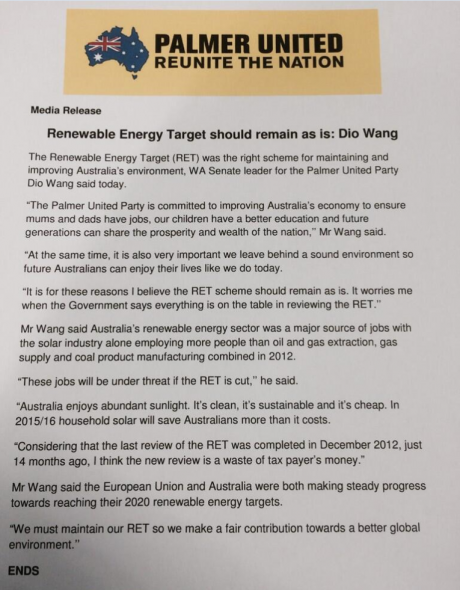Clive Palmer - renewable energy's unlikely saviour
In a move that has caused surprise across the renewable energy sector, the Palmer United Party’s top Western Australia senate candidate, Dio Wang has issued a press release headlined 'Renewable Energy Target should remain as is: Dio Wang'.
In it Dio Wang states:
“I believe the RET scheme should remain as it. It worries me when the government says everything is on the table in reviewing the RET.”
He even goes as far as saying:
“Considering that the last review of the RET was completed in December 2012, just 14 months ago, I think the new review is a waste of taxpayers' money.”
In lines that bear the indelible finger prints of the Australian Solar Council’s WA senate election marketing campaign (Solar recruits the anti-carbon tax marketer, March 12), the press release also states:
Mr Wang said that Australia’s renewable energy sector was a major source of jobs with the solar industry alone employing more people than the oil and gas extraction, gas supply and coal product manufacturing combined in 2012.
The Sydney Morning Herald reports today that PUP leader Clive Palmer has endorsed the statement of Wang, adding that he is a ''supporter of renewable energy'' and that this has “nothing to do with the carbon tax”.
If this press release really represents a committed position of the PUP, then it is game over for Origin Energy and EnergyAustralia’s lobbying campaign to have the Renewable Energy Target watered down.
Irrespective of the forthcoming WA senate election outcome, one could reasonably rely on the required 37 votes in the Senate to defeat any amendments to the Renewable Energy Act. The Greens supply nine votes and Labor 25, but most likely more after the WA election. In addition, while Xenophon complains about wind farm noise when push comes to shove he’ll most likely reject measures seen to be anti-renewable energy. Then PUP supplies the remaining two votes to make 37.
Still, when it comes to hard-nosed negotiations in the Senate, where other concessions will be on offer, the reliability of this commitment is questionable.
Clive Palmer, who is seeking to develop one of the largest coal mines in Australia, has in the past been dismissive of the threat posed by human-induced global warming. And his company is only one of three in Australia that has not complied with its obligation to pay for its carbon emissions. In addition, during a discussion on the ABC’s Q&A program one could hardly describe his statements as supportive of suggestions from audience members that government policy should be driving growth in renewables.
So far the PUP’s policy platform is one so full of contradictions that the only thing consistent about it is that it aims to be all things to all people. In one breath it says the coal seam gas industry “should take a breather” until thorough research is undertaken into its environmental and health impacts, and that coal trains should have covers to prevent release of coal dust. But then on the other hand, Clive Palmer rails against environmental regulations that constrain growth of the mining sector.
It would be a story stranger than fiction if Clive Palmer were to be the renewable energy industry’s knight in shining armour. But in the end he has proven to be a chameleon that changes his spots in order to serve his interests. Picking a fight with the Coalition over the RET will do little to harm his business interests, while it could aid his political interests.
This dramatic turn of events serves to illustrate that there are great dangers awaiting the Coalition in the Senate if it seeks to dramatically water down the RET. The Coalition’s rhetoric during the election was that it was supportive of renewable energy and the target. While it was deliberately vague about what its support for the Renewable Energy Target actually meant, it has no electoral mandate for large scale changes.
As Tony Abbott acknowledged after the fiasco of trying to reinterpret his Gonski school funding commitment, the public takes a very dim view of tricky wordsmithing of election commitments. Countless polls of the Australian public indicate strong support for renewable energy. Labor and Palmer, as well as a renewable energy industry with nothing to lose, could take a lot of skin off Abbott in any Senate showdown over the RET.
Press release from Palmer United Party

















